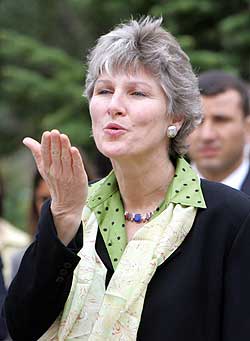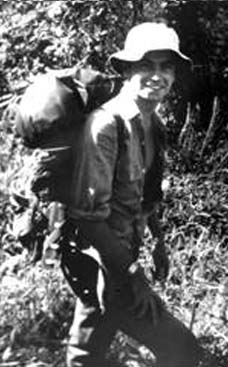
Today, as the Djerejian report observed, “Arabs and Muslims have a surfeit of opinion and information about the United States.” We are bound to lose any battle of spin control, whether carried out by a pal of the president or by the most credible Arabic-speaking proxy. From this we may draw two opposite conclusions. One is that we must simply accept that the cost of acting in our national interest is that publics in the Islamic world will shower us with contempt. The alternative is to recognize that public opinion is the medium in which we now operate. All diplomacy is therefore public diplomacy. When Vice President Dick Cheney and other senior officials split hairs over torture, that shapes our ability to conduct the war on terror more powerfully than do the interrogation techniques themselves. What we say about ourselves no longer has much effect; but what we are seen doing — on occasion, what we are caught doing — matters immensely. Recognizing that we live in a transparent world does not mean abandoning the weapons of advocacy. When I taught at a college in India 30 years ago, my colleagues loved the American Center in the provincial capital of Hyderabad; to them, that was the United States. We should have lots more latter-day Amerika Hauser. And we should expand our exchange programs and scholarships. But these are open invitations, not arguments on our behalf. They succeed because they have no brief. The radio and TV stations and glossy magazines that we have propagated across the Muslim world have accomplished almost nothing, but the American military’s swift mobilization to help victims of the 2005 earthquake in Pakistan did wonders for our image (if briefly).
James Traub writes: Perhaps the time has come to rethink what we mean by public diplomacy
Persuading Them
By JAMES TRAUB
Published: November 25, 2007
The announcement this month that Karen Hughes would be stepping down as undersecretary of state for public diplomacy was greeted with a combination of relief and derision. In her first appearance in the Middle East, in 2005, this Bush confidante and fellow Texan avoided substantive issues while reassuring audiences that “my most important title is Mom” and that Americans “greatly value many religious faiths.” The trip was a very public fiasco for the White House; thereafter, Hughes appears to have been largely withdrawn from circulation.
Skip to next paragraph
Enlarge This Image
Hughes was not the first casualty of the administration’s attempts to improve America’s global image. That distinction belongs to Charlotte Beers, a Madison Avenue executive who produced and broadcast throughout the Middle East a series of uplifting video clips called “Muslim Life in America.” Beers retired for “health reasons” in 2003 after the campaign was widely ridiculed in the Arab press. She was succeeded by Margaret Tutwiler, a former State Department official, who was welcomed with great fanfare and who stepped down after a few months. Today, six years after the terrorist attacks produced a moment of global kinship, America is feared, loathed and misunderstood across the world. According to surveys conducted by the Pew Charitable Trusts, between 2002 and 2007 favorable views of the United States fell from 60 to 30 percent in Germany, from 61 to 29 in Indonesia and from 30 to 9 in Turkey (though in Pakistan the figure rose from 10 percent to 15).
Perhaps the time has come to rethink what we mean by public diplomacy. In 2003, the Djerejian report — named for the veteran diplomat who presided over the study, Edward Djerejian — made the eye-catching allegation that “a process of unilateral disarmament in the weapons of advocacy over the last decade has contributed to widespread hostility toward Americans and left us vulnerable to lethal threats.” The report noted that the U.S. was spending just $25 million for “outreach programs” in the Arab and broader Muslim worlds. Only 54 State Department employees had achieved a high level of fluency in Arabic. Public-affairs officials themselves considered American broadcasting efforts in the region ineffective.
The “weapons of advocacy” had fallen into a long decline since their heyday in the cold war, a contest that pitted political systems against each other more than armies. In “Total Cold War,” an account of the war of persuasion in the 1950s, the historian Kenneth Osgood argues that “from the highest levels of the national security establishment to the remotest diplomatic outposts abroad, political warfare became the organizing concept for American foreign policy during the Eisenhower presidency.” The Eisenhower administration established the United States Information Agency, which had a global portfolio of radio and TV stations and magazines; the agency devoted half its very large budget in West Germany to cultural centers and libraries known as Amerika Hauser. At the same time, of course, the C.I.A. engaged in the darker business of covertly manipulating public opinion, not to mention engineering coups in Guatemala and Iran.
We are locked once again in a war of ideas. And public-diplomacy enthusiasts would have us gird ourselves once again with the weapons of advocacy. But the political weapons of the cold war are as antiquated today as the military ones. The 1950s witnessed the birth in the non-Western world of mass media as well as mass politics. The U.S. could dominate the airwaves not only of South Vietnam but even of Japan, as Osgood describes; and we could thereby reach the small but growing segment of society engaged in political discussion. That world is gone forever. Today, as the Djerejian report observed, “Arabs and Muslims have a surfeit of opinion and information about the United States.” We are bound to lose any battle of spin control, whether carried out by a pal of the president or by the most credible Arabic-speaking proxy.
From this we may draw two opposite conclusions. One is that we must simply accept that the cost of acting in our national interest is that publics in the Islamic world will shower us with contempt. The alternative is to recognize that public opinion is the medium in which we now operate. All diplomacy is therefore public diplomacy. When Vice President Dick Cheney and other senior officials split hairs over torture, that shapes our ability to conduct the war on terror more powerfully than do the interrogation techniques themselves. What we say about ourselves no longer has much effect; but what we are seen doing — on occasion, what we are caught doing — matters immensely.
Recognizing that we live in a transparent world does not mean abandoning the weapons of advocacy. When I taught at a college in India 30 years ago, my colleagues loved the American Center in the provincial capital of Hyderabad; to them, that was the United States. We should have lots more latter-day Amerika Hauser. And we should expand our exchange programs and scholarships. But these are open invitations, not arguments on our behalf. They succeed because they have no brief. The radio and TV stations and glossy magazines that we have propagated across the Muslim world have accomplished almost nothing, but the American military’s swift mobilization to help victims of the 2005 earthquake in Pakistan did wonders for our image (if briefly).
Eisenhower was much taken with the supposed powers of propaganda, but he also insisted that his officials take account of “the psychological factor,” as he called it, when formulating global strategy. That didn’t mean subordinating national security to polling data. It did, however, rest on the recognition that we need to persuade others by our actions — and a faith that we could do so. Is that so very naïve?
James Traub, a contributing writer, is working on a book about democracy promotion.













